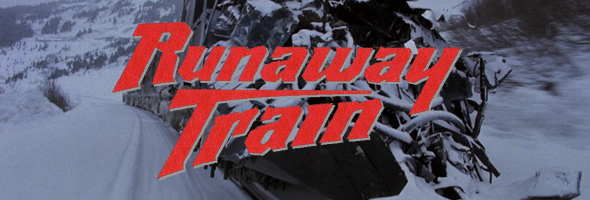

Perhaps the most beloved name in action films from the 1980s, Cannon Films conquered theater screens throughout the decade with an onslaught of As almost every critic noted, the film was based (more or less) on a hefty screenplay co-written years earlier by Akira Kurosawa, who intended to direct it. Several American writers were brought on board to tighten the screenplay and make it English friendly, including novelist Paul Zindel, while directing duties were handed to Russian filmmaker Andrei Konchalovsky, who had made the leap to English productions a year earlier with the all-star Cannon drama Maria's Lovers. Konchalovsky stuck around to do two more Cannon films, Duet for One and Shy People, while the studio attempted to recapture the respect garnered with this film But back to Runaway Train. Actor Jon Voight wasn't too far removed from his Oscar-winning role in 1978's Coming Home, but his career had been hobbled by choices like Hal Ashby's ill-fated Lookin' to Get Out and the soapy Table for Five. Padding up his slight frame with thick clothing and sporting intimidating makeup to look like a hardened convict, he surprised many viewers in the leading role of Manny, a bank robber and hero figure to the inmates at Alaska's Stonehaven Maximum Security Prison. When seeing this film today, it's important to remember that its relentless approach was something of a novelty at the time, years before the formula was adapted into other films like Speed and Unstoppable. Taking a cue from The Wages of Fear, it also manages to find a simple but effective metaphor between its title vehicle and the treatment of the prisoners, who are also turned into single-minded vessels by their situation. Granted, it's not very subtle, and Voight, Ryan, and Roberts deliver performances pitched to the rafters that may not be to everyone's taste. However, they're all hugely entertaining and manage to sell a story that becomes purely ridiculous in the final stretch, turning it into a primal clash between forces of nature where the normal rules of reality don't apply. Though you'd be forgiven for ignoring them next to the main performances, If any film epitomizes the look known as "'80s film stock," it's this one. The rough, greyish textures of the film are far removed from the pure black levels seen in Hollywood productions in past decades, and the skin tones veer towards the ruddy side. That caused more than a little havoc on home video versions released on VHS and DVD from MGM, with the NTSC versions in particular falling apart completely in some shots. The Region B Blu-Ray from Arrow comes about as close to the theatrical look as possible for home viewing, looking far more detailed and capturing that tricky atmosphere quite well; the LPCM 2.0 stereo audio is obviously limited by the original Dolby Stereo elements, but the electronic score (an early one by composer Trevor Jones in between his work on The Dark Crystal and Labyrinth) sounds just fine.
While the previous DVD versions only included the trailer (which is carried over here), the Arrow release adds four terrific interview featurettes, all of which tie in well with each other. Voight gets the first and longest piece, "From Thespian to Fugitive Star" (37 minutes), while Konchalovsky ("Running on Empty," 16 minutes), Roberts ("Sweet and Savage," 16 minutes), and Heffner ("The Calm before the Chaos," 18 minutes) each offer their own memories of the production. Voight's appearance (and makeup in particular) inspire some great anecdotes from Roberts, while Heffner still gets a big kick out of being singled out by critics for the first time with this film. Also covered are Cannon's eccentric distribution system at the time (with L.A. attendees forced to go to an Indian movie theater to see it before it went wide), the hefty original form of the screenplay, Konchalovsky passing over Jodie Foster (much to her disappointment) for De Mornay because she was "too pretty," and the director's aggressive style, which everyone admired even when it drove them a bit crazy. Everyone still holds the film in very high regard, with good reason, and it's great to hear their articulate and often entertaining thoughts on it nearly three decades later. Finally the set rounds out with the Trailers from Hell version of the trailer with director Rod Lurie and a liner notes with an essay by critic Michael Brooke, a text interview with production designer Stephen Marsh, and a Life Magazine article that inspired the central concept.
Directed by Andrei Konchalovsky
Starring Jon Voight, Eric Roberts, Rebecca De Mornay, Kyle T. Heffner, John P. Ryan
Arrow (Blu-Ray) (UK RB/R2 HD/PAL), MGM (worldwide DVD) / WS (1.85:1) (16:9) / DD2.0
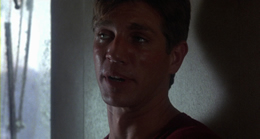 films starring Charles Bronson, Chuck Norris, and Sho Kosugi, with other genres like horror and teen comedy sprinkled in for good measure. However, by 1985 the team of Menahem Golan and Yoram Globus wanted to be taken a little more seriously. They had already backed a John Cassavetes prestige drama, Love Streams, and were hoping to dominate the summer with their hugely budgeted space vampire epic, Lifeforce. That didn't really happen, but by Christmas they had a surprise in store with what is now generally regarded as the most "respectable" film in the Cannon stable: Runaway Train, an existential, snowy character study/action film that racked up the studio's best reviews ever and a trio of Oscar nominations.
films starring Charles Bronson, Chuck Norris, and Sho Kosugi, with other genres like horror and teen comedy sprinkled in for good measure. However, by 1985 the team of Menahem Golan and Yoram Globus wanted to be taken a little more seriously. They had already backed a John Cassavetes prestige drama, Love Streams, and were hoping to dominate the summer with their hugely budgeted space vampire epic, Lifeforce. That didn't really happen, but by Christmas they had a surprise in store with what is now generally regarded as the most "respectable" film in the Cannon stable: Runaway Train, an existential, snowy character study/action film that racked up the studio's best reviews ever and a trio of Oscar nominations.
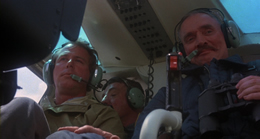 via a slew of eccentric choices like Franco Zeffirelli's Otello, Jean-Luc Godard's King Lear, Norman Mailer's Tough Guys Don't Dance, and the strongest of the bunch, Barbet Schroeder's Barfly. Meanwhile Konchalovsky went on to the greener pastures of Tango & Cash and the infamous 2010 3D version of The Nutcracker with evil Nazi rats.
via a slew of eccentric choices like Franco Zeffirelli's Otello, Jean-Luc Godard's King Lear, Norman Mailer's Tough Guys Don't Dance, and the strongest of the bunch, Barbet Schroeder's Barfly. Meanwhile Konchalovsky went on to the greener pastures of Tango & Cash and the infamous 2010 3D version of The Nutcracker with evil Nazi rats.
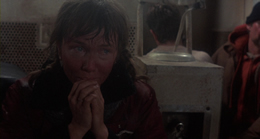 One of the warden's Ranken (Ryan), has an intense personal grudge against Manny (whom he welded into his cell after two escape attempts), but now Manny has another plan. With the aid of another inmate, laundry worker Buck (Roberts), he slips out into the snowy wilderness, with Buck tagged along uninvited as they eventually board a locomotive -- whose engineer promptly drops dead of a heart attack, leaving the train to fry its brakes and speed unmanned across the landscape. Another stowaway on the train, Sara (De Mornay), becomes entangled in their fight for survival as Ranken and the main dispatcher, Barstow (Heffner), have different plans for dealing with the situation.
One of the warden's Ranken (Ryan), has an intense personal grudge against Manny (whom he welded into his cell after two escape attempts), but now Manny has another plan. With the aid of another inmate, laundry worker Buck (Roberts), he slips out into the snowy wilderness, with Buck tagged along uninvited as they eventually board a locomotive -- whose engineer promptly drops dead of a heart attack, leaving the train to fry its brakes and speed unmanned across the landscape. Another stowaway on the train, Sara (De Mornay), becomes entangled in their fight for survival as Ranken and the main dispatcher, Barstow (Heffner), have different plans for dealing with the situation.
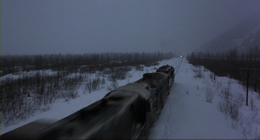 there's also a prime supporting cast here stacked with familiar faces like Ken nth McMillan (Dune), T.K. Carter (The Thing), Tommy "Tiny" Lister (Prison), and even a young Danny "Machete" Trejo in the first of several bits parts for Cannon.
there's also a prime supporting cast here stacked with familiar faces like Ken nth McMillan (Dune), T.K. Carter (The Thing), Tommy "Tiny" Lister (Prison), and even a young Danny "Machete" Trejo in the first of several bits parts for Cannon.
Reviewed on July 8, 2013.
![]()